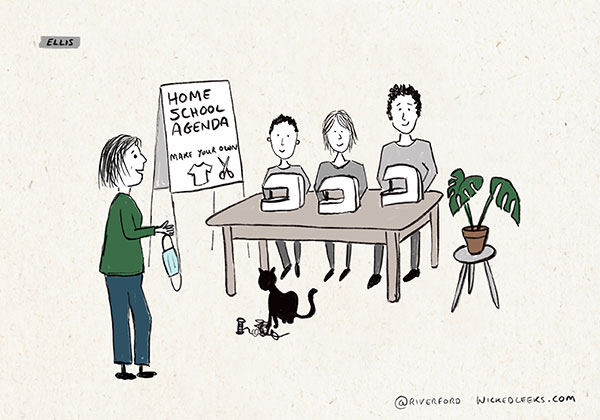I remember the first things I sewed: a comb case (with some basic embroidery) and an oven glove (my first machining). These were for dad and mum respectively – as designated by our needlework teacher who was very much aligned with traditional gender roles.
But kids in the time of corona may well learn the ins and outs of basic backstitch making a face mask, at home, via the internet. Older kids across the UK, skilled in design and technology, have spent part of this week making visors for NHS.
Nothing signals the end of the age of innocence like our kids hand stitching survival equipment. But it also must feel really good to be learning something new in order to make something extremely helpful.
In truth, all those years ago, my dad never kept his comb in a case and my chef-mother preferred to snatch at molten-larva-hot trays with a tea towel. This means that I was effectively making yet more fashion and textile waste through my early sewing projects. And making waste undermines the sustainability boon of the whole make-do-and-mend and sew-your-own culture.
But however misshapen or unwanted, sewing always teaches you something. Last week, I received a low-key press release from a woman called Rosalind in Aberdeen. “I don’t know if this will be of interest to you,” she wrote, “but I’m launching a website called repairwhatyouwear.com.” Of interest to me? Reader, I quickly became obsessed by Ros’s common-sense tutorials and patterns (yes, there is a corona mask, and no, you do not need a machine).
From threading a needle to mending holes in jumpers, this is a no cost, simple to follow, well taught resource of vital techniques to mend and extend the life of clothes. But really it goes further than that.
This week I also spent a great deal of time on skype or zoom calls to my friends and colleagues in Bangladesh (I have been an activist against wage theft and slavery conditions in the global fashion industry for many years). These included Kalpona Akter, who runs the Bangladesh Centre for Worker Solidarity and who has spent many years campaigning for a better deal for garment workers. Indeed, as a former child worker, Kalpona has a very different experience of sewing to survive, that we’ll leave for a different time.
Kalpona and her colleagues in Bangladesh and other low wage economies that produce fast fashion for Western markets are used to crisis. Lest we forget, 1,134 garment workers, predominantly young women, were killed in a single morning when the Rana Plaza complex collapsed in the Savar district of Dhaka.
But Covid-19 is a supply and a demand crisis unlike any we have seen. Some of our best known brands have cancelled orders that have already been manufactured to the tune of millions of pounds. This would seem to include Primark, which, according to the Bangladesh Garment Manufacturers and Exporters Association (BGMEA), has cancelled orders for 83 million garments worth a total of £135m and suspended orders for a further 84m worth £121m.
This will leave poorer workers destitute. At the same time, laid off workers must self isolate in accommodation where 60 people share one loo. Around 10 factories have shifted to sewing Personal Protective Equipment (PPE). Those workers, however, work cheek by jowl without any PPE themselves. Kalpona fears for their safety but she says they want to support health workers around the world. It is time that we considered these garment workers, usually forgotten, as heroes too.

For those who know how today’s fast fashion industry works, the behaviour of famous high street brands is unsurprising, but no less heart-breaking. Some of the richest people in the world have made their money through this supply chain, which relies on the poorest and most marginalised workers in the world. They must pay up and take responsibility for these orders, and these factories in the months ahead. The charity Labour Behind the Label (Labourbehindthelabel.org) would love your support in applying pressure on these brands.
After all this is over, we’ll be told that the main way to support workers in the future is to buy more cheap clothing. We’ll be told that the patriotic and pragmatic thing to do is to carry on consuming. This latest crisis in the global garment industry sends yet another warning signal. We cannot continue to support brands built on exploitation.
There is no give in this system, and no resilience. It cannot be reformed, so we must reject it and fashion something new. Upping your sewing skills during this period of lockdown should be your first move. Threading a needle just became an act of profound change.
I would love to hear from you if you’ve got any questions that you’d like me to answer in this column. Drop me a line on @lucysiegle #ClimateofCrisis #WickedLeeks, or comment below.
*To hear more of my interview with Kalpona Akter in Bangladesh, listen to Fashion Critical, a podcast I host with Livia Firth available on iTunes or through Eco-Age.com.















0 Comments